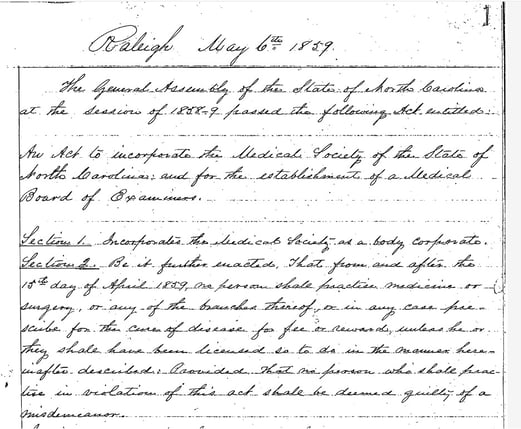The Medical Board as an Ally?

Dr. Damian McHugh explores how physicians can use resources from their state medical boards to advance their knowledge and skills while working toward the common goal of serving patients.
Few pieces of snail mail precipitate that nervous feeling deep in your stomach like a letter from the Medical Board, or even worse, that slightly thicker formal packet from a plaintiff’s attorney. Curi members enjoy coverage for most Medical Board complaints under the Broad Regulatory Exclusion (BRE) part of their policy, but that doesn’t always alleviate the initial fear. What physicians need to realize, however, is that the Medical Board doesn’t have to be their enemy. In fact, we are all on the same side, as we share in a common goal to protect patients. By viewing the Medical Board as a resource, rather than an adversary, together we can build a safe environment of healing for the communities we serve.
Today, I want to offer you a glimpse into the history of the Medical Board in in North Carolina (NCMB), where I served as a board member from 2019 to 2022.
The Board of Medical Examiners in North Carolina was authorized by statute in 1859 and has been in existence ever since.

The Board is a public organization that regulates doctors, PAs, and a small number of other medical professionals. It operates outside of the state budget process, with 100 percent of its budget provided solely by license application and renewal fees. It protects the people of North Carolina and the integrity of the medical profession through just and vigilant licensing and regulation.
Medicine is unique in its regulatory system, and physicians are one of the few members of the public that enjoy the privilege of being introduced on the floor of the House at the General Assembly. In the same way, very few professions still enjoy the considerable benefit of full self-regulation the way that medical professionals do. The alternative is to have a government or trade body that regulates a profession, akin to the FDA or the FAA. Although not often spoken of, physicians and PAs are in a fortunate position in states where the regulatory body is comprised in a similar fashion.
If you visit the NCMB site, you will be welcomed by a wide range of resources. Although the primary aim of the body is to protect the people, the Board is progressive and proactive. As such it’s perhaps no surprise that the first listed resource is a link to wellness resources for clinicians. A very helpful and perhaps underutilized area is in the link to laws, rules, and position statements.
Unfortunately, too few physicians get involved in the inner workings of regulatory or payment policies, so many of the decisions where doctors’ voices might have been heard are often made by others. As the old adage goes, “if you’re not at the table you’re on the menu.” And while I fully understand the demands of caring for patients, it’s important that physicians make an attempt to stay involved in the policies and regulations that directly affect them.
Much is still uttered about the Hippocratic Oath. However, while nearly all U.S. medical school graduations include a public promise, and some use an updated version of Hippocrates’ words, not a single student utters the original Hippocratic Oath.
Instead, today’s medical students recite a vast and growing range of oaths. Although admittedly old-fashioned, I can’t find a concise and more meaningful recitation of our values as physicians than the words of the Board’s position statement, enumerating the essence of the physician-patient relationship:
“A licensee’s first responsibility is to his/her patients. Having assumed care of a patient, the licensee’s responsibility is to provide competent, compassionate, and economically prudent care within the standards of acceptable medical practice and to make treatment decisions that are in the best interest of the patient. It is the Board’s position that it is unethical for a licensee to allow financial incentives or other interests to adversely affect or influence her medical judgment or patient care. Patient advocacy is a fundamental element of the licensee-patient relationship and should not be altered by the healthcare system or setting in which a licensee practices. All licensees should exercise their best professional judgment when making patient care decisions. Patient welfare must always take priority over economic or other interests. Licensees who hold administrative leadership positions should foster policies that support the licensee-patient relationship and enhance the quality of patient care.”
My advice is simply to get to know the workings and writings of your Medical Board a little better. There is an abundance of helpful guidance to help you stay on the right path in the dense forest that has become medical practice in modern times.
Should you receive a complaint from your Medical Board we encourage you to contact our risk or claims department immediately and earnestly. We will promptly set about confirming coverage and then act as your trusted advisor and take a prudent step forward in an arena that is unnerving and unfamiliar to the majority of physicians. Forewarned is forearmed.
Thank you for taking the time to read my blog post and for checking out some of the helpful pointers I allude to above. For Curi members in other States, I’d value hearing if your medical board is organized in a significantly different way. It’s my daily goal to support the growing cohort of our physicians in the rapidly increasing number of states that Curi is fortunate to serve. It remains, for me, as for all of us, a privilege.
About the Author










Comments